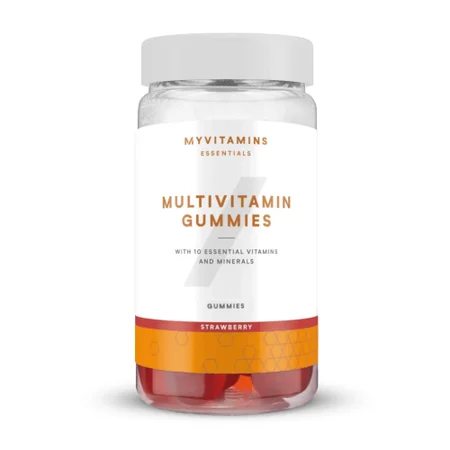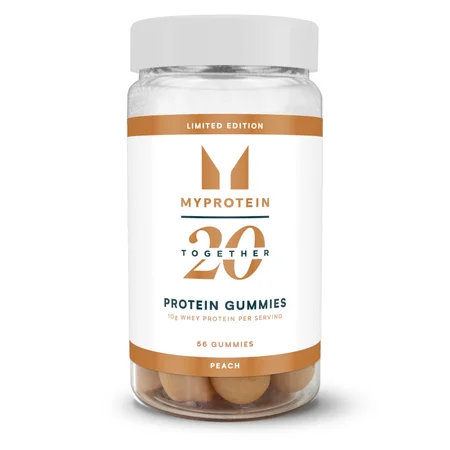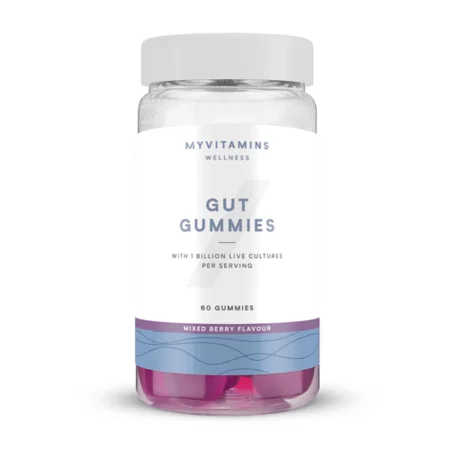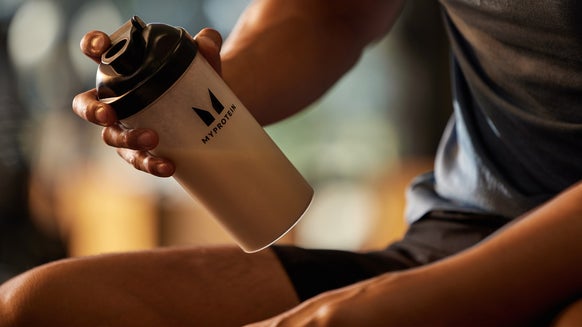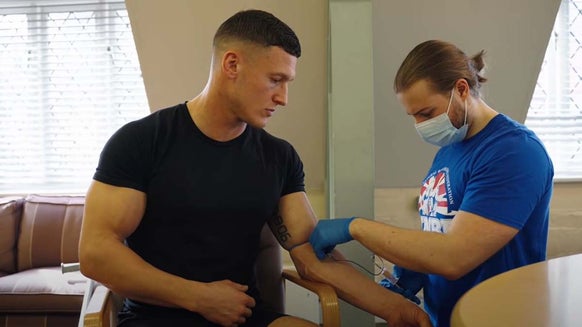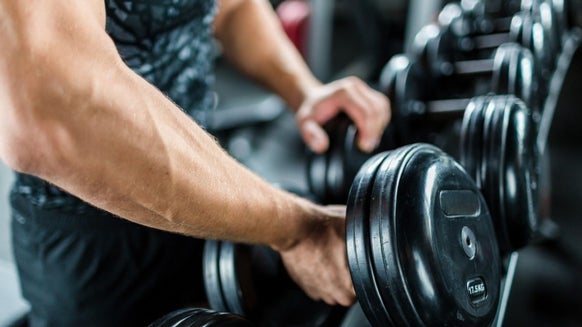Here’s Why Exercise Makes You Feel So Good

It is becoming more and more important that we take the time to take care of our mental health as well as taking care of our physical health. Exercise is a great way to combine both mental and physical wellbeing in one go, the rush of post workout endorphins is something that no one can deny enjoying.
Exercise has many benefits when it comes to improving your fitness, strength, and endurance but it can also play a vital role in improving overall mood, releasing endorphins, boosting brain health, raise your self-esteem and improve quality of life.
There can also be a large sense of community within the fitness space, and this can also help build source of social support which can also help boost your mental health.
Why is exercise linked with mental health?
There have been a number of studies that have investigated the link between mental health and exercise, one study by University of Nebraska Medical Centre stated that “Exercise improves mental health by reducing anxiety, depression, and negative mood and by improving self-esteem and cognitive function.2 Exercise has also been found to alleviate symptoms such as low self-esteem and social withdrawal”
In many studies the health benefits from regular excise should be encouraged within the mental health space as it helps to improve sleep, stress, mood, energy, mental alertness, and other physical aspects too.
How does exercise impact the mind?
Exercise or physical activity has also been linked to your brains ability to think, learn or problem solve and be able to promote better emotional balance. There are also links between exercise and an improvement in memory and reducing the risk of cognitive decline diseases, such a dementia.
One study by Division of Nutrition, Physical Activity, and Obesity, National Centre for Chronic Disease Prevention and Health Promotion, Centres for Disease Control and Prevention found that cognitive decline is twice a common in adults who inactive than those who active.
There is evidence that also shows that regular exercise helps you to sleep and recover better, could reduce the risk of some cancers, and aid in a longer life.

What are endorphins?
Endorphins are a chemical released in the brain and are commonly known as the ‘feel good’ chemical. They are natural pain and stress relievers which are released when performing enjoyable activities such as exercise.
Endorphins are a neuropeptide or chemical signal the brain releases to block the perception of pain, they are released by the brain during enjoyable events but also in relation to emotions such as laughter, love, but can also be linked to enjoyable foods and pain management.
Increasing endorphin levels can help to boost mood, self-esteem, support cognitive function and immune health but also reduce stress, anxiety and depression as well as regulating appetite and reducing inflammation.
What are the mental health benefits of exercise?
There are many benefits to exercises, we’ve pulled together the top mental health benefits:
Improves mood
One of the biggest things that exercise can do is to improve your mood, the feel good chemically can help you feel better. We all know that post workout high, and this is down to those chemicals, the more we stimulate them the high level we can build and in term these chemical s can help to improve your mood, reduce anxiety and depression, and stimulate a feeling of calm.
Improves sleep
Making sure to exercise regularly can help to improve your sleep and the quality of it, a good night’s rest can help to supports your brain function. Exercising helps our body to release feel-good chemicals such as endorphins which reduce pre-sleep anxiety, and can help improve some common sleep problems such as restless leg syndrome, insomnia and sleep apnoea.
Increased energy levels
Regular exercise is a great way to boost overall energy levels, again down to those awesome feel-good chemicals they can help to block pain perception and leave you feeling better, helping you to feel more energized and helping you move.
Regular exercise also helps cardiovascular health and overall fitness which makes going about daily activities easier and leaving you with more energy at the end of the day.
Reduces physical health issues
Making sure to work out regularly can help you to manage physical health as well which can boost mental health too. From helping with weight management, improving bone and muscular strength as well as cardiovascular health it can help you perform everyday activities.
Many studies have should that those who exercise regularly were less likely to suffer from health problems such as heart disease, strokes, high blood pressure or diabetes, as well as mental diseases such as dementia.
Improves your confidence
How you feel about yourself can impact your mental health significantly, having good self-esteem is a great way to boost our mental health and it’s been shown that regular exercise can significantly help with improving self-esteem thus boosting mental health.
Exercise makes us feel mentally and physically stronger which helps to boost self -esteem both in our ability to perform but also increases a positive attitude towards our body.
Improves cognitive function
Exercise is a great way to delay the cognitive effects of aging and some cognitive related disease such as dementia.
Studies have shown that concentration and cognitive function are enhanced after exercise and over a prolonged period of regular exercise helps to improve the blood flow and increase protein levels in brain aiding in cognitive function.

Tips for getting started with exercise for your mental health
What to get started but aren’t sure how, don’t worry here are our top tips for getting started on your fitness journey for better physical and mental health:
Start slowly and gradually build
Take your time to build new habits and allow your body and mind to adjust to new movements and a workout schedule. Once you’ve got into the swing or things and feel more comfortable and confident you can then start to build up the length, frequency, and intensity of your workouts.
Workout with a friend
It can be scary to start going into a gym or a program on your own, so why not get a friend, family member or colleague involved and workout together. This is a great way to build confidence, and have someone to motivate and encourage you, while also keeping you accountable.
If you don’t have a someone to workout it’s not a problem, joining a class or trying class-based gyms are great ways to find a supportive community of likeminded people to keep you motivated and have some fun.
Be flexible with your routine
Remember when starting out that life happens and it’s important to not worry or blame yourself if you need to change your plans or workouts one week. Take the time to plan your workouts for the upcoming week and be flexible with your routine if you need too.
We can’t predict life but by being flexible with our training we make sure you don’t feel overwhelmed or too much pressure.
Find a program you enjoy
When starting out making sure you enjoy your program is a great way to stay committed and motivated to keep going, workouts don’t have to be long and boring there are many different styles of training that you can try.
Keeping things fresh can also be a great way to keep your body guessing and eat any potential training plateaus but also keep you on track to reach your end goal.
Take home message
Are you ready to improve your physical and mental health? Yeah, we thought so! There have been numerous studies that show the endless benefits that exercise can have on your mental health, from reducing anxiety, stress, and depression to improved cognitive function help to ward off cognitive diseases.
There is a no feeling like that post workout high and regular exercise can help the body to translate this into every confidence and improved self-esteem. If these were enough the physical benefits such as weight management and improved strength can also have you feeling better about your physical and mental self.
Remember you don’t have to go mad, even 30 minuets of exercise a day can make a difference from getting out for a walk to a sweaty hitt session it can make you feel better, there are so many different ways to be active that everyone can enjoy the benefits.
FIND MORE HERE:

Dopamine Menus: How to Be Happy and Dopamenu Examples
A to-do list that brings you joy.

Mental Health Helplines
Remember, it's alright not to feel alright sometimes. If you need to talk, here are some free contacts you can get in touch with.

Running for Anxiety | What You Need to Know
PT explains the correlation.

